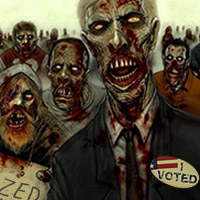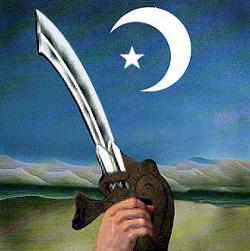
I was a precocious child raised by a liberal mother and a conservative father. I still recall the first time I was ever asked my political opinion in a second grade social studies class. We were conducting a mock election, and were told to choose a political affiliation. I was told that Republicans believe things should stay the same, and Democrats believe things should be changed. It is a biased over simplification, but I chose the Democrat Party because as bad as things were, any change seemed preferable. Later that year, in the same class, when asked what I hoped to be when I grew up I answered, “A benevolent dictator.”
I was more or less politically asleep for most of my life. I was intrigued by politics, its theory and philosophy, but that never seemed to connect with the choices Americans were given at the ballot. In my heart I always hoped that a third party candidate would win, just to disrupt the false dichotomy, but I had never voted. The 2003 invasion of Iraq was my wake up call. That year, while scouring through volumes of the congressional record, I discovered speeches by Ron Paul and found an unlikely political ally in a Texas Republican. In 2004 I cast the first ballot of my life for John Kerry for the same reason I chose the Democrats in second grade. As bad as things were, any change seemed preferable.
In 2008 Ron Paul ran for the Republican nomination for president. After 8 years of Bush I despised the Republicans passionately and publicly. But I held my nose and registered my party affiliation to vote for him in the primary. I found hundreds of people of like mind who shared my dissatisfaction with the two-man con of party politics. I found others who wanted a non interventionist foreign policy, who understood the fraud of paper currency, and who just wanted the government off their backs and out of their private lives. I found a political home among the libertarians.
When Dr. Paul lost the Republican nomination I considered casting my vote for Barry Obama for the same reason I voted for John Kerry, and the same reason I chose the Democrats in second grade. As bad as things were, any change seemed preferable.
Before the election, on July 2, 2008 in an interview with the Military Times editorial board, then Senator, Barry Obama said that, “what essentially sets a nation-state apart (from the private sector), is a monopoly on violence.” That statement sent me on a political odyssey, the end of which I have not yet reached.
The phrase originates from Max Weber’s book Politics as a Vocation, although he would have expressed it in the original German, “Gewaltmonopol des Staates.” Weber was a German lawyer, politician and sociologist and his definition of government, “that entity which claims a monopoly on the legitimate use of violence in a given area,” is widely accepted by most political scientists today. He is regarded as the principal thinker in modern western statecraft. I know we like to pretend this honor belongs to Thomas Jefferson, but don’t kid yourself.
In 1918 Weber became a consultant to the commission charged with drafting the Constitution of the Weimar Republic. Perhaps his greatest contribution was his support of Article 48 which states, “If public security and order are seriously disturbed or endangered within the Reich, the President of the Reich may take measures necessary for their restoration, intervening if need be with the assistance of the armed forces. For this purpose he may suspend, in whole or in part, the fundamental rights provided in Articles 114, 117, 118, 123, 124 and 153.”
In affect this Article gave the German president the legal authority to suspend all individual rights, including but not limited to, privacy in the home, privacy in correspondence, freedom of expression, freedom of assembly, the right to form religious societies and the right to property. And, to do this unilaterally, without input from the German people of their representative body. This was the article used by Adolf Hitler to suppress opposition and obtain dictatorial powers. There is disagreement as to whether Max Weber would have supported the Nazi Party if he had lived to see it, but no question that he laid the philosophical groundwork for their success. Indeed, when one claims a monopoly on violence the pretense of personal liberties is merely a platitude to keep the tax cattle in line.
The political climate in America today owes more to Max Weber than any of the founding fathers, and the authority usurped by our imperial presidents has more similitude with this Article from the Weimar Constitution than any Article in our own. Learning this, and understanding it deep in my bones, changed the way I look at politics forever.
If we know that a monopoly is economically undesirable, and we know that violence is morally undesirable, why is a violent monopoly desirable at all? Most people call me an anarchist for even asking such a question, but I am not really. My political beliefs are to anarchy what agnosticism is to atheism. I believe a legitimate government can exist, but haven’t seen one in my lifetime. As for anarchy, as bad as things are, any change seems preferable.
To be continued.











